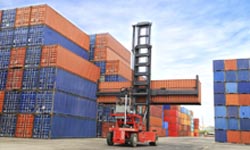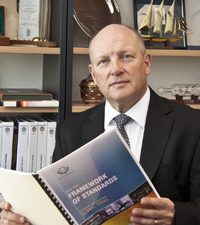 A national customs research centre based at Charles Sturt University (CSU) is helping to free up trading barriers for global exporters, including in Australia.
A national customs research centre based at Charles Sturt University (CSU) is helping to free up trading barriers for global exporters, including in Australia.
Researchers with CSU's Centre for Customs and Excise Studies, based in Canberra, have worked with the World Trade Organisation (WTO) to develop a Trade Facilitation Self-Assessment Guide. The Guide has been assisting developing countries to assess their needs for promoting international trade by meeting the requirements of the WTO's Trade Facilitation Agreement (TFA), which was first negotiated in 2013.
Centre Director Professor David Widdowson said the Trade Facilitation Self-Assessment Guide aims to improve the movement of goods across national borders and reduce trading costs by explaining the simpler, more effective national regulations and procedures.
 "The TFA itself addresses such issues as public access to information, stakeholder consultation, predictability and impartiality of decision making, rights of appeal, transparency, administrative fairness, inter-agency and international cooperation, and modern approaches to managing compliance," Professor Widdowson said.
"The TFA itself addresses such issues as public access to information, stakeholder consultation, predictability and impartiality of decision making, rights of appeal, transparency, administrative fairness, inter-agency and international cooperation, and modern approaches to managing compliance," Professor Widdowson said.
"As a net exporting nation, Australia is also provided important opportunities thanks to the TFA. While Australia's customs clearance arrangements are relatively streamlined, those of many of our trading partners are not.
"Consequently, while improving local arrangements will benefit Australian traders, the potential benefits to flow from improved arrangements in Australia's export markets are far greater. Australian exporters will have greater certainty and clarity in their dealings with customs authorities and border agencies in the countries to which their goods are being exported.
"Australia has a very real stake in seeing the TFA come into force."
The Guide developed by the CSU Centre for Customs and Excise Studies helps countries intending to ratify the TFA to critically assess their current performance against the aims of the agreement.
"It's not just a 'tick-the-box' exercise. The WTO wants nations signing up to the TFA to meet their obligations under the Agreement, particularly as they will be legally bound to comply as signatory nations," Professor Widdowson said.
Under the international customs agreements of the World Customs Organisation, countries can abrogate their commitments without fear of legal retribution, but this is not the case for the WTO.
"In addition, member countries are expected to have in place provisions to facilitate trade through mechanisms such as advance rulings and single window processing," he said.
"Advance rulings are binding decisions on certain matters such as the classification or customs value of goods that are obtained prior to importation. Therefore, importers have greater certainty and no 'nasty surprises' when the goods arrive."
The single window concept allows exporters to lodge import/export documents with a government in a single place, an Internet-based portal.
"This portal avoids duplication, allows information to be distributed to all relevant agencies to process, and facilitates a single, consolidated message with all permissions, to be returned to the trader. It is designed to provide a coordinated agency service to the public," Professor Widdowson said.
For the TFA to enter into force, two-thirds of the WTO's 164 member countries must each ratify the agreement. To date, 92 member countries had completed this process, leaving an additional 18 ratifications before the agreement comes into force.
Australia accepted the Protocol in June 2015, one of the first countries to lend its support to the initiative.





Social
Explore the world of social